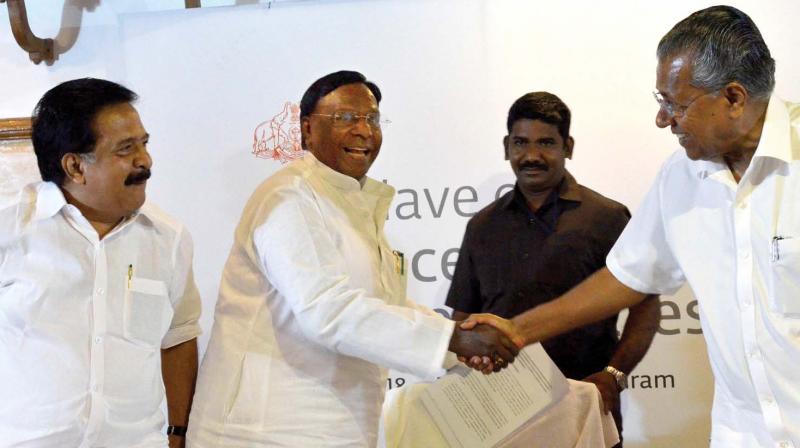South India FMs' conclave: South cries injustice
Conclave of FMs to include more shortchanged states.

THIRUVANANTHAPURAM: The Conclave of Finance Ministers of Southern States, which had its first meeting here on Tuesday, has decided to expand its scope and include more states, including those from north India like West Bengal and Punjab, that could be potentially hurt by the terms of reference of the 15th Finance Commission. The next round of what would be now called just the ‘Conclave of State Finance Ministers’ will be held in Visakhapatnam, the industrial centre of Andhra Pradesh, by the end of April or early May. Political compulsions forced Tamil Nadu and Telangana to give the Conclave a pass. Only three states (Andhra Pradesh, Karnataka, and Kerala) and on union territory (Puducherry) participated.
“A joint memorandum would be drawn up after the Visakhapatnam Conclave, where we have decided to rope in at least New Delhi, Punjab, West Bengal and Orissa,” finance minister T.M. Thomas said. “Feelers will be sent to Tamil Nadu and Telangana again,” he added. The tentative understanding is that the memorandum, which will be presented to the President himself, would demand either the amendment of the terms of reference or include addenda to the ToR incorporating the suggestions of the states.
Gulati Institute of Finance and Taxation (GIFT) will function as the ‘conclave secretariat’ where the memorandum will be drawn up with inputs from experts in the field. Dr Isaac said that there was consensus at the Conclave that the Centre was purposefully trying to deprive the state of their fair share of the tax collection. “The 14th FC had increased the share of states from the divisible pool to 42 percent. But this they took away through a reduction in grants and a lowering of the Centre’s share in centrally sponsored schemes,” Dr Isaac said.
He said that it was now argued that the Centre required more than the states because it was saddled with more burden in the post-GST scenario. “It is said the Centre has to pay GST compensation to the states. But this is a bogus argument because the compensation is paid from a cess created expressly for the purpose,” the minister said.
The other issue flagged at the Conclave was the stringent conditions being imposed on states. The Fiscal Responsibility and Budget Management (FRBM) guidelines insist that the state should bring down their debt to 20 percent of the GSDP. “Kerala’s debt is now 30 percent, and to bring it down to 20 percent means that we have to shorten our borrowing from three percent of the GSDP to just 1.7 percent of the GSDP. This will be fiscally disastrous,” Isaac said. The participants also strongly opposed the performance incentive mooted in the ToR of the 15th FC. “It is not for a FC to sit in judgement of a state’ performance. If so, the Centre’s performance, too, should be evaluated,” Dr Isaac said.
Karnataka’s agriculture minister Krishna Byre Gowda was perhaps the most strident critic of the incentive method. “Majority of incentives are designed in a way it affects progressive states negatively. Also, it introduces a subjective arbitrariness into the working of the FC,” Mr Gowda said. He argued that incentives could be offered, but through centrally sponsored schemes and not through the FC.

